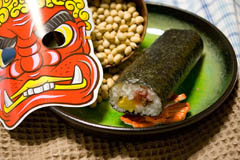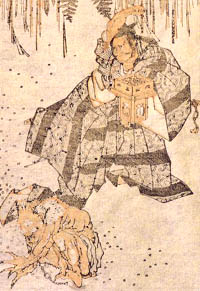


A typical demon mask, some sushi and some beans for throwing.
Feb. 2 - "Demons Out! Good Luck In!" (Oni wa soto, Fuku wa uchi!), I cried along with Tama-chan and Ryu-chan, the young daughters of my friend, on my first Setsubun holiday in Japan. Ryu-chan, a very well behaved four-year old, seemed particularly excited that her mother allowed, even encouraged her to throw perfectly edible roasted soy beans out the window into the garden. Her father explained to me that throwing the beans outside the home would symbolically purify their residence by driving away evil spirits that bring misfortune and bad health. We then sat down to eat roasted soybeans - one for each year of our life and one extra for good luck - and rolled sushi.

This old woodblock print by Hokusai shows someone casting out a demon by throwing beans.
As I was eating this food, I thought about the words soto and uchi which I had learned meant "outside" and "inside" in English. The month before, when visiting a large Buddhist temple, I saw many Japanese using this same Chinese character for "inside" when they wrote the expression "kanai anzen" (safety in the household) on a small wooden tablet offered as a prayer. I became a bit confused as I had never used the word "inside" or "outside" in English when praying for safety or the health of my family, nor had I ever chased demons from the inside to the outside of my home.
I then realized that the words "inside" and "outside" carried different connotations in English and Japanese. I sighed a little, recognizing my feeble abilities in understanding so many aspects of Japanese language and culture. But I also acknowledged that these very differences make living in a foreign country so full of adventure. Besides, the sushi that day was simply delicious!
Until next time,
Jim
Dear Mr. Zumwalt,
Today is SETSUBUN, throwing beans day, yelling "Oniwa soto, fukuwa uchi." Uchi means inside, and I cannot find any cultural differences about the word "inside" in American culture. Everybody in Japan consider we would like to bring in happiness, and take evils out. Why not Americans?
Americans may live by Christianity, and fraternity may be the most important criteria for their values, so you do not want to throw bad luck out to others. But still they are inside your mind. Out implies "exclude," I think.
Sushi is called EHOMAKI, which is eaten on the evening of Feb. 3 with our eyes closed with no words, wishing our resolutions.
Having read your blog, I am always impressed by your wide-open attitude towards our culture and customs.
Great to know that you have fully enjoyed SETSUBUN. We also eat sardines on the day of SETSUBUN. Traditionally, we put a head of sardine and a holly at the front door to protect home from evils. It is considered the smoke from grilling a sardine would keep evils away and a holly would poke in the eye of evils. You might want to try this tradition next year.
Looking forward to your making updates to the blog. (Will Ann-san write about HINAMATSURI next month?)